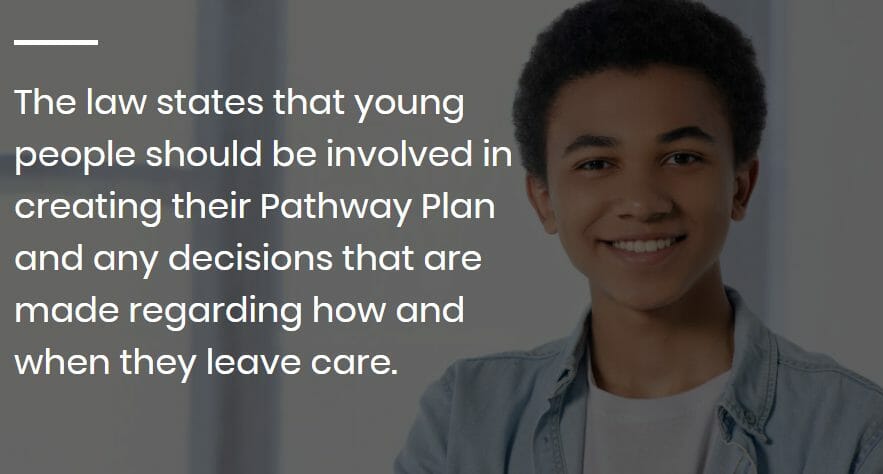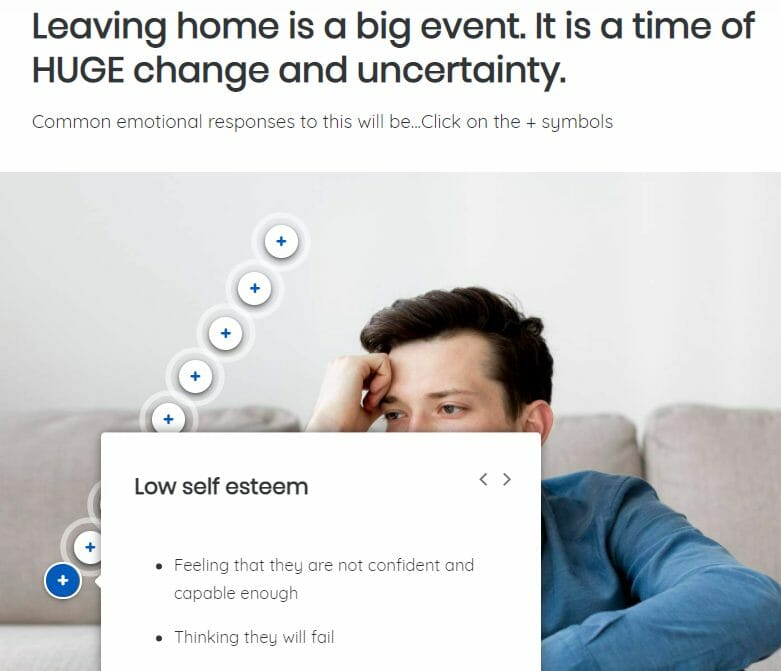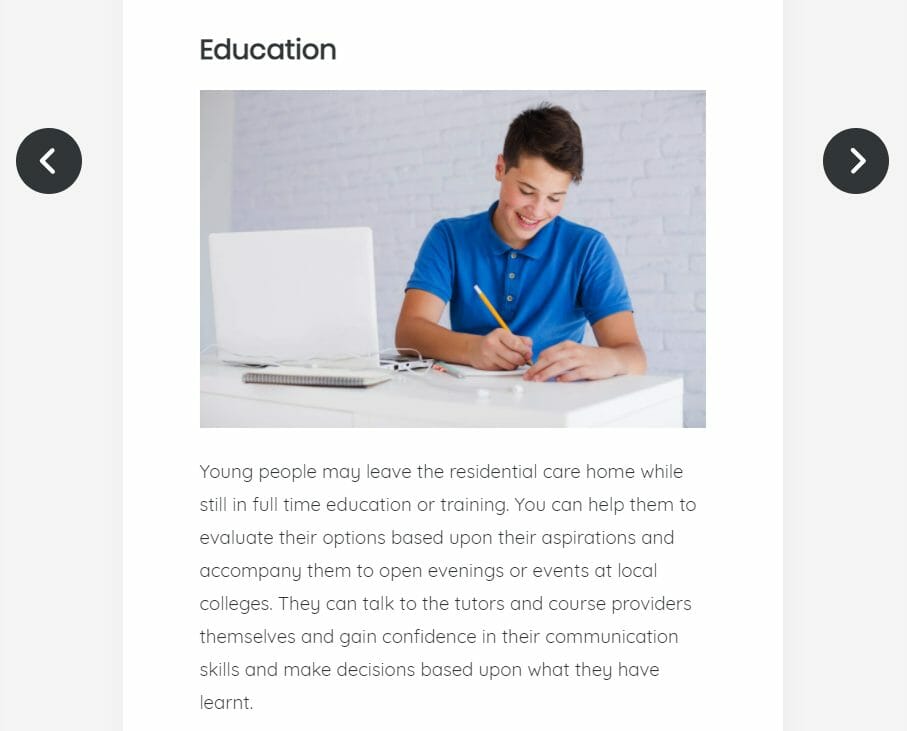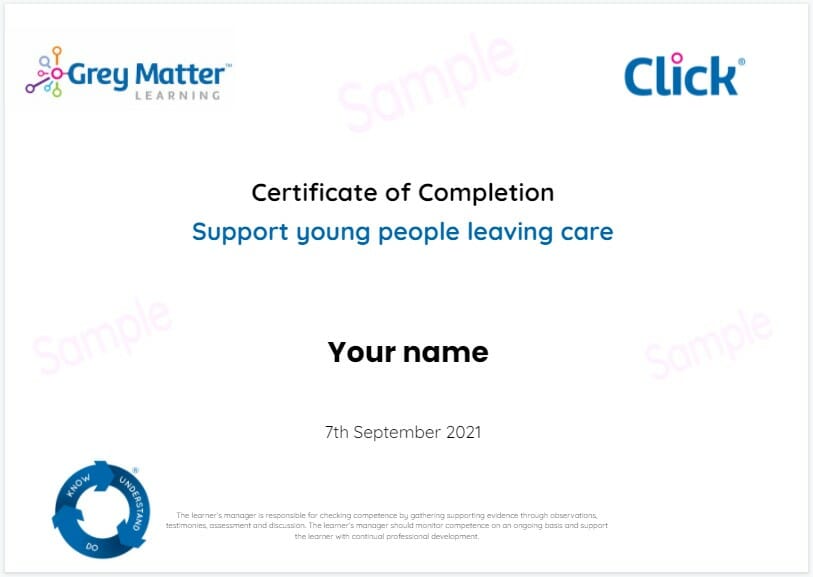Support Young People Leaving Care

This online course covers all aspects of support for young people leaving care. We explain the statutory and legal frameworks that apply and the importance of a planned approach to maximise positive outcomes.
We evaluate their emotional responses to leaving care and how you can support them to make their own decisions about when to leave and where they will live. Living independently has many challenges. We explore how you can educate, support and prepare them for leaving the residential care setting and where they can access sources of information and advice.
We explore why they may visit the care setting after they have left and how you can continue to support them in the future. We provide lots of information and links to organisations that can provide information and sources of support for young people leaving care and there are videos to watch along the way.
Who should take this online course?
This course has been designed specifically for people working with young people and provides focus on residential settings. It may also be useful to a wider audience of people who would like to know more about young people leaving care. The course provides content to meet qualification units relating to residential childcare.
We offer our courses for your LMS as SCORM files. Depending on the scope of what you need there may be a charge for this. Please connect to discuss it with us.
Online Course Content
- 1.1 Describe the statutory and legal frameworks that apply to young people when they leave care
- 1.2 Explain how to give support in a way that balances legal duties of care
- 1.3. Explain the importance of a planned and phased approach to fulfil the duty of care
- 2.1 Describe common emotional responses to change and uncertainty about the future
- 3.1 Explain why young people in residential care may have additional reasons for anxiety
- 3.2 Explain the emotional importance of having somewhere that is ‘home’
- 3.3 Explain the importance of team members conveying confidence and aspiration for the future
- 3.4 Describe strategies to reduce anxiety for young people preparing to leave care
- 4.1 Support young people to understand at what point they will be expected to move on
- 4.2 Support young people to explore their own views, perceptions and choices about leaving care
- 4.3 Support young people to understand the potential outcomes of their choices
- 4.4 Support young people to recognise society norms as they explore their plans
- 4.5 Challenge practice that excludes young people from planning their move from care
- 4.6 Source information and support designed for young people leaving care
- 5.1 Explain why practical support and advice for leaving care is a long term risk
- 5.2 Support young people to access sources of information and advice on
- 5.3 Support young people to plan for a future income
- 5.4 Provide young people with information about how to manage personal finances
- 5.5 Provide young people with information to prepare them to manage and maintain accommodation
- 5.6 Prepare plans with young people that will assist them in maintaining their own health
- 5.7 Work with young people to ensure that they can shop for, store and prepare food
- 6.1 Use active listening skills to engage with with YP when they express views or concerns
- 6.2 Communicate reassurance and confidence to the young person about their capacity to succeed
- 6.3 Support young people to plan and prepare for their future social life and relationships
- 6.4 Encourage young people to maintain positive relationships
- 6.5 Support YP to understand how resilience can help them face challenges and disappointments
- 6.6 Provide information about where young people can find support if they feel isolated or lonely
- 7.1 Support young people to develop skills in how to assess risks to their personal safety
- 7.2 Support young people to understand ways to minimise risks
- 7.3 Support young people to understand sources of information and support available to them
- 8.1 Identify reasons why a young person may visit the care setting after they have left
- 8.2 Explain why it is important to welcome YP who choose to visit after they have left
- 8.3 Describe ways to reassure YP they continue to be valued in the setting after they have left
- 8.4 Explain the importance of signposting young people to sources of support that address any issues
Aims of the course
By the end of the training course, you will:
- Understand the statutory and legal frameworks in relation to young people who are leaving care
- Understand emotional responses to change
- Understand young people’s emotional responses about leaving care
- Be able to support young people to plan their move from care
- Be able to prepare young people for practical aspects of daily living as they leave care
- Be able to support young people with the emotional challenges of leaving care
- Be able to prepare young people to manage personal risks when they have moved on from care
- Understand how to provide a continued welcome in the care setting after young people have left
Course Screenshots




Social Care Unlimited Course and Certificate Package
Price options are per user per month, inclusive
- Most FlexibleMonthly Plan 6 excluding VATUnlimited Access to ALL coursesNo set-up fees or hidden chargesTraining MatrixPrice per person, per month1 month notice period
- Better than Half PriceAnnual Plan 3 p/month (exc. VAT)Unlimited Access to ALL coursesNo set-up fees or hidden chargesTraining MatrixPrice per person, per yearBilled Annually
- For organisationsMultiple Plan POA For multiple staff, contact us for a demo, bespoke pricing and a dedicated account managerUnlimited Access to ALL coursesNo set-up fees or hidden chargesTraining MatrixPOANotice Period: By arrangement
Recycle Licences
Our plans allow organisations to recycle licences instead of always purchasing more credits - no hidden charges for changes in staff! If you would like to purchase more than 50 licences, book a demo and know more please contact us.
If you sign in to your account on Click before you take this training course, you will be able to change the accessibility settings to suit your needs. This includes translation into 100+ languages, some of which can also be read out loud to you.
Duty of Candour
FREE Duty of Candour Online Training Course In March 2021, the Care Quality Commission (CQC), who regulate social care in England, published…
Supervision Skills for Managers
FREE Supervision Skills for Managers Online Training Course Supervision is linked to fundamental standards, which in turn, are linked to the Care…
Stress and Resilience Course
Who should take this course? This course has been designed specifically for Care and Support Workers working in a social care setting….
Why use Grey Matter Learning?
- Our methodology values previous learning, saving time
- Clever accessibility settings including 100+ languages
- 100+ high quality courses, specially written for care
- Join thousands of services and local authorities
- Proven to reduce staff turnover and improve CQC ratings
- Established 15 years - we know what works
- Skills for Care Centre of Excellence, CPD certification
- No hidden charges, we recycle your licences








Social Care Hubs